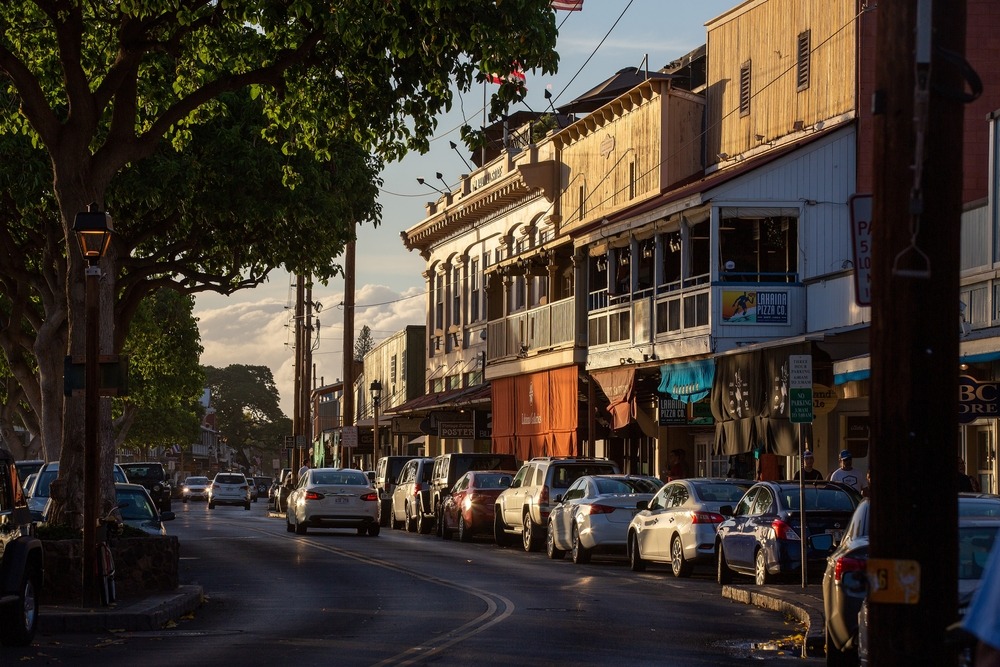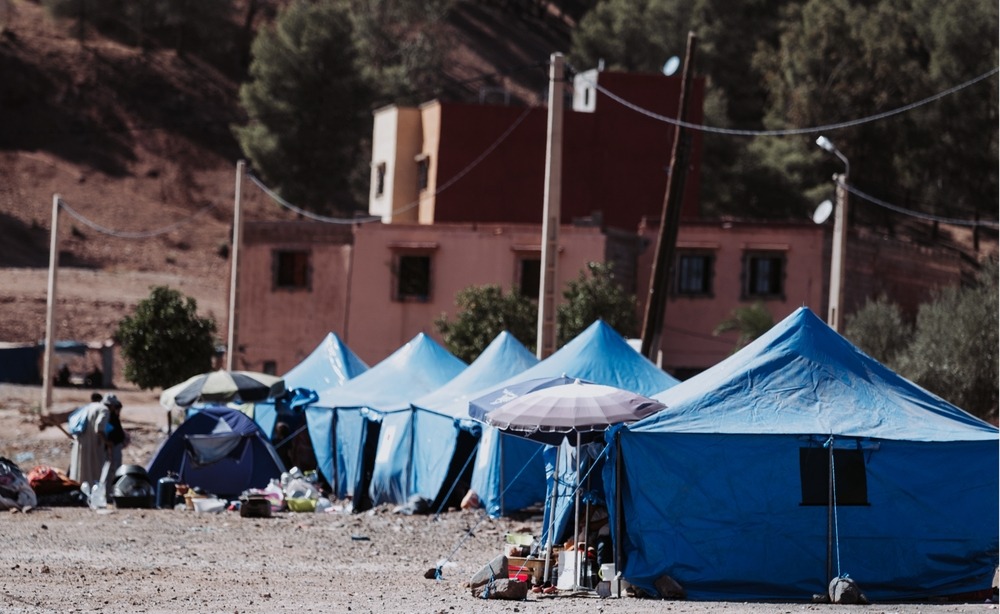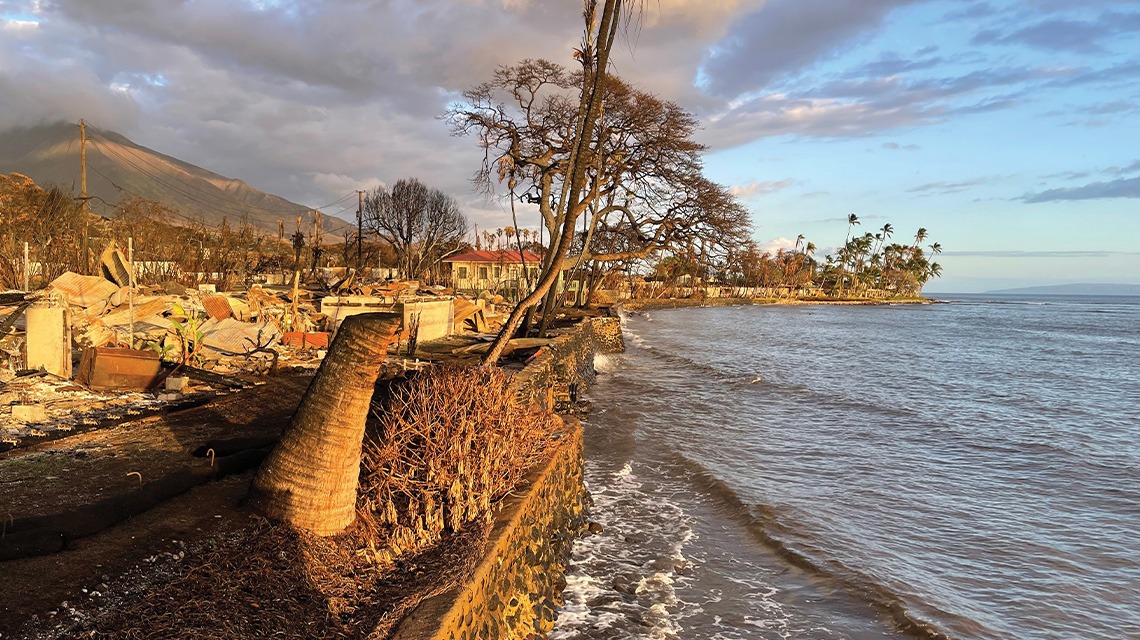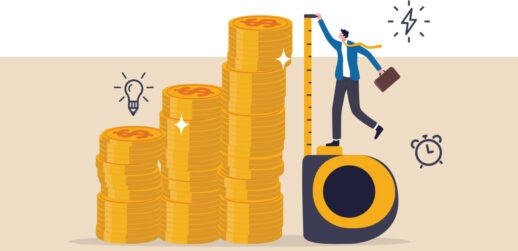What to do when your destination becomes a no-go zone
“D” as in Disaster. Destruction. Devastation. You’ve planned for months for Lahaina or Marrakesh. Or before that, maybe hurricane-ravaged Fort Myers or New Orleans. Or anywhere that’s the latest Weather Channel obsession or sudden epicenter of mayhem or violence. Then what?
How do you pivot in the best possible way? Do you stay, relocate, postpone? How do you make it right by your company or client, your attendees and, yes, the destination itself? Is there an ethical obligation not to abandon relationships with venues and individuals in their time of crisis?
The experts we queried agree on one thing: Each case is different, and must be evaluated with the specifics and variables at hand. But each offers an opportunity to reinforce your worth as a meeting professional to all parties involved.
Here’s more of what we learned.
Tragedy of Maui, Deconstructed

Maui is the classic case study. Before wildfires driven by gales of wind swept westward to the Pacific, destroying one of the island’s most popular attractions, the historic whaling town of Lahaina, and taking the lives of nearly 100, the homes and cars and livelihoods of thousands of residents—wreaking over $4 billion in damages overall—the local hot button issue with regard to visitors was overtourism.
“Do you stay, relocate, postpone? Is there an ethical obligation not to abandon relationships with venues and individuals in their time of crisis?”
The roadways of West Maui had been perpetually clogged. Lahaina, on any given day, was thronged with sunburned mainlanders, sometimes to the detriment of native Hawaiian artifacts and historical sites, as well as to the descendants of Maui’s first people, many of whom still regard the arrival of Europeans in the late 1700s as an invasion of their sovereign land.
In the immediate aftermath of the fires, stunned and grieving locals pleaded for tourists to stay away, and well-intentioned celebrities amplified these pleas on social media. In those first horrible days, the total footprint of damage was not known, and West Maui was without power and internet connection.
Read More: Hospitality Industry Rushes to Support Wildfire Victims in Hawai’i
The governor declared much of West Maui off limits, and even displaced Lahaina residents, many of whom who were temporarily housed alongside emergency workers in luxury resorts and hotels in Kaanapali and Kapalua to the north, were not permitted to return to their destroyed homes out of concern for their safety and to allow the search for victims to continue. Two months later, long after the ashes had cooled, the West Maui communities of Kaanapali, Napili, Honokowai and Kapalua reopened to visitors, on Oct. 8.
By then, the economic reality of a drastic drop in visitors across the island, the vast majority of which was untouched by flames, had sunk in. An analysis by the Economic Research Organization at the University of Hawaii found that inbound arrivals had dropped by about three-quarters, a disaster of its own. “With about $270 daily spending per visitor to Maui, the loss of revenue adds up to more than $13 million per day,” the group reported. The report calculated that Maui County as a whole would experience a shortfall in Transient Accommodations Tax revenue of about $5 million a month.
Losses in Lahaina were, of course, all but total. Gone for the foreseeable future was more than $70 million per month from its resorts, hotels and short-term rentals—some 1,500 guest rooms in the town and nearby environs were destroyed—plus revenue from food services, retail sales and other businesses.
Yet in a destination so dependent on both group and leisure visitors—70 cents of every dollar generated on the island, says the Maui Economic Development Board—jobs go away if tourists stay away. Lahaina alone employed about 8,500 individuals in the visitor industry, but a whopping 75% of all private sector jobs on the island are related to tourism. Although exact numbers are elusive, it’s safe to say that these jobs include hundreds, if not thousands, of meeting professionals, event specialists, wedding coordinators, team-building companies and others who serve MICE activity. Perhaps their numbers swell even more compared to other popular destinations because local cultural sensitivities and attractions can best be navigated with the help of on-island guidance.
There is another stark reality at play. Hawai’i has one of the highest costs of living in the United States. To live comfortably, experts say a family income of $120,000 to $200,000 is needed. According to Ziprecruiter, as of September the average annual pay for the Hospitality Tourism jobs category in Hawai’i was $49,915 a year. And that’s full time—much of the industry relies on part-time gig workers.
“In a destination so dependent on both group and leisure visitors—70 cents of every dollar generated on Maui—jobs go away if tourists stay away. A whopping 75% of all private sector jobs on the island are related to tourism.”
“I’ve been in the DMO business since 1987, and there are certain things we train for, but this isn’t one of them,” says John Reyes, senior vice president of Hawai’i Visitors & Convention Bureau (HVCB) and chief MCI sales officer for Meet Hawai’i. “People in Maui work two, three jobs. They call it their 9/11. It’s much more than a crisis.”
Reyes is urging meeting professionals to strike a balance between “being respectful and economic survival for Maui. We’ve been trying to educate everyone on what’s open.” It’s been an emotional tsunami. “How do you do that with the loss of life? A director of sales for Hawai’i Visitors Bureau lost his home and brother.”
Disaster Leadership
No one wanted to be first to bring a group back to Maui. Lots of donations for relief, but no bookings. Then someone showed the way.
On Sept. 6, Signature Travel Network, a Southern California-based, member-owned cooperative of travel agencies, went ahead with its owners meeting in South Maui, an area untouched by the fires. But it wasn’t the same meeting they would have had.
Signature Travel Network CEO Alex Sharp challenged the travel advisors in attendance “to demonstrate how respectful, responsible and impactful tourism to the island was possible during a time when so many are still grieving,” in the words of John Monahan, president and CEO of HCVB.
The result was inspiring.
- More than $400,000 in donations and silent auction proceeds for the Hawai‘i Community Foundation’s Maui Strong Fund, Maui Food Bank and Maui Humane Society.
- An additional $75,000-$100,000 from AmaWaterways based on its booking incentive to give $100 per booking for the next month to the STN Travel Elevates Maui Relief Fundraising Effort.
- More than 7,000 pounds of supplies donated to Maui charity partners.
- Hundreds of volunteer hours helping to make meals, serve at the Maui Humane Society and to sort through donated items.
- Tens of thousands of dollars spent at a “Maui Market” supporting local Maui vendors.
- Tens of thousands of dollars in additional cash tips provided directly to staff that took care of the group at the Grand Wailea, A Waldorf Astoria Resort; Andaz Maui at Wailea Resort; and Fairmont Kea Lani, Maui.
- A $2 million infusion into the local economy during the three-day meeting.
After the meeting, Sharp declared, “Not only was it the right decision, but it led to the best meeting of our 67-year history. Doing the right thing always makes people feel good. For those attendees with initial hesitation that our event would distract from recovery efforts, all concerns were immediately put to rest as soon as they met local Maui residents, each of whom was there with open arms and gratitude for travelers returning to the island. Giving back to Maui gave our meeting purpose and the outpouring of gratitude lifted everyone’s spirits.”
The Ethics of Disaster

Like Signature Travel on Maui, there were groups leading the way in the wake of September’s horrifying earthquake in Morocco that killed 3,000 people. The World Bank Group and the International Monetary Fund agreed to hold its annual meeting in Marrakech as scheduled beginning Oct. 9. A joint statement noted that it was of “utmost importance” that the meetings were conducted in a way that “does not hamper the relief efforts underway and that is respectful to the victims and the Moroccan people.”
Reuters reported that the two organizations planned to repurpose temporary structures going up for the event for relief efforts and to refocus the meeting agenda on aid.
Which begs the question: Do meeting professionals or their event sponsors have an obligation to these destinations in trouble?
Meeting scientist Joseph Allen thinks there can be. The director of the Center of Meeting Effectiveness at the Rocky Mountain Center for Occupational and Environmental Health and professor of industrial and organizational psychology at the University of Utah says, “I think the politics or types of decision-making around this have to be tied to the mission/values and goals of the organization that is planning the meeting….There are ethical issues. What is the right thing? What are the optics? It’s a balancing act.”
Read More: Marrakesh is Set for Recovery Following Morocco Earthquake
Allen continues: “As a meeting professional, you have to be prepared. How do you adjust when natural disasters or climate situations intrude? It depends on the situation. With a natural disaster, there’s sometimes a call by attendees to support the destination. But from the organizer’s point of view, you’re putting money down ahead of time. That brings into focus the whole issue of having insurance on your conferences. If you don’t have that, and you’re trying to rearrange plans, you’re kind of in trouble. But there is also the desire to give back to places in trouble. So, there are both ethical and pragmatic considerations.”
Among the key variables in these types of decisions is timing. “Within a month or two after a disaster,” Allen continues, “you’re probably not going to be able to go to that actual destination. But say you’re working with a hotel chain: They might be able to relocate you to another of their hotels down the way, to another town on Maui or another island, for example. It depends on how far out you are in planning. Or you can quickly shift to a virtual location, and recoup some of your costs by doing so. We don’t like them as much, but we also know we can do successful virtual conferences. It goes back to the timeline again.”
An actual business ethicist agrees. Toronto-based Chris MacDonald is a senior fellow at Duke University’s Kenan Institute for Ethics and co-editor of The Business Ethics Journal Review. “You really have to get into the examples, but once the crisis is over, one of the best things you can do is bring your dollars there,” he says. “I do think it is an ethical issue, spending money on the local economy. It may not be obligatory, but all you choose to do in the wake of disaster is ethically significant.”
MacDonald is also quick to underscore that such decisions are nuanced and case-specific. “If there’s a long-term relationship with the hotel, the destination, then the argument can be made that charity begins at home, and you’re part of the community. Yet It’s hard to say there’s a specific obligation. When we’re talking about ethics, it’s too easy to slip into simple binary thinking, right or wrong. Is it wrong of a particular organization to simply pull out? That kind of blunt thinking often isn’t helpful. Instead, we can look to our values: What kind of organization are we?”
To widen the ethical lens, is a natural disaster decision that much different from, say, overtourism concerns? Sustainability considerations like carbon emissions from air miles? Politics, such as avoiding a destination because of government anti-LBGTQ+ policies?
“It’s too easy to slip into simple binary thinking, right or wrong. Instead we can look to our values: What kind of organization are we?”
“I’m not sure there’s a firm line to draw,” MacDonald replies. “There are places in the world that are political disasters. No one would hold a meeting in Haiti right now. The political situation is just too awful. Or, there are places where women might not feel safe and respected. A destination is not just a place with nice sunsets and good restaurants. There are a lot of things to think about for the safety and well-being of your participants.”
In conclusion, Allen emphasizes that such decisions should not be made in a vacuum. “A good chunk of your attendees may be ‘no go,’ even if you as a planner or company sponsor want to go,” he says. “Pay attention to your stakeholders or you may end up with a 20% attendance, which could be a death sentence for some small organizations.”
Disaster Recovery for Meeting Pros
From the Instagram posts of meetings industry nonprofit SEARCH Foundation…
“In the darkness, we can find light. On Aug. 8, I woke to a small fire and called 911. The fire department called to locate the fire, and I was told it was put out. We lost power and the winds ripped through our home. At 3 p.m., I smelled smoke and packed some belongings, grabbed my dog and partner as we hung onto the stair railings escaping 130 mph wind gusts. We cried in traffic trying to escape the fire we had no idea the direction of.
“We were the lucky ones. We lost our home, our town and everything we know, but we have our lives.
“With the help of SEARCH, we are able to pay a month and a half of our mortgage as we begin to process our losses and rebuild. We cannot thank this organization enough for the support we have received. Thank you all for the bottom of our hearts.”
Another post…
“In the barren, singed, charcoal landscape which has suddenly become our lives, these funds are like blades of fresh new grass which have just begun to poke through the ash; new life, and new hope, amidst darkness.”
Kate Patay, CPCE, is vice president of engagement for Terramar DMC. But she’s also serving her second term as chair of SEARCH Foundation, which directly funds meeting, event and catering professionals in need, from accidents and illness to hurricanes, wildfires and other catastrophic losses.
“If you think you’ve had a tough day, I challenge you to read even one case that our Crisis Relief Committee grades and not be grateful for everything in your life,” she says.
When we talked in mid-September, SEARCH grants—which can be up to $5,000 a year—had gone out to 44 recipients on Maui like those who wrote their heartfelt thanks posted on the all-volunteer nonprofit’s social media. Those grants totaled $144,780, the lion’s share of the more than $207,000 distributed year to date overall. Since its founding, SEARCH has sent $1.2 million to industry applicants in need.
To fund cases on Maui this year, the SEARCH board of directors had to tap into its reserves. So, increasing its fundraising has become essential. Full disclosure, Smart Meetings is an annual SEARCH sponsor.
“We desperately need people to donate so we can keep doing this,” Patay says. “To date, we have funded 100 percent of qualified cases. I never want to have to turn anybody away, so whether you can give $20 or $20,000, it’s going to mean a lot to somebody in our industry. A hospitality student donated $4.93, her daily Starbucks allowance. We have individuals who have set up recurring donations of $5 per month and some that have set up recurring donations of $500 per month, all tax deductible under our 501c3. Please help us continue to help.”
Patay continues: “I think we always need to stand behind each other as a community. When disaster strikes, we need to rally around in any way we can. Sometimes it’s to continue to bring your meeting there, other times it’s not. It’s listening to those on the ground and determining what’s best.”




